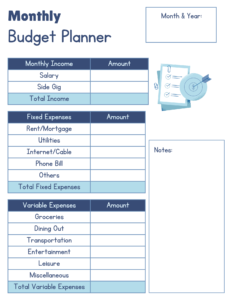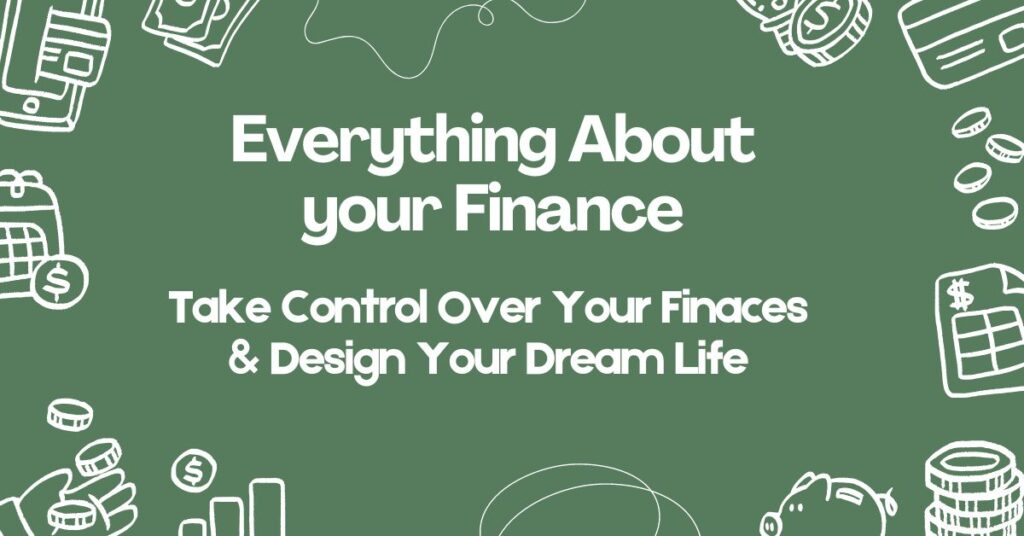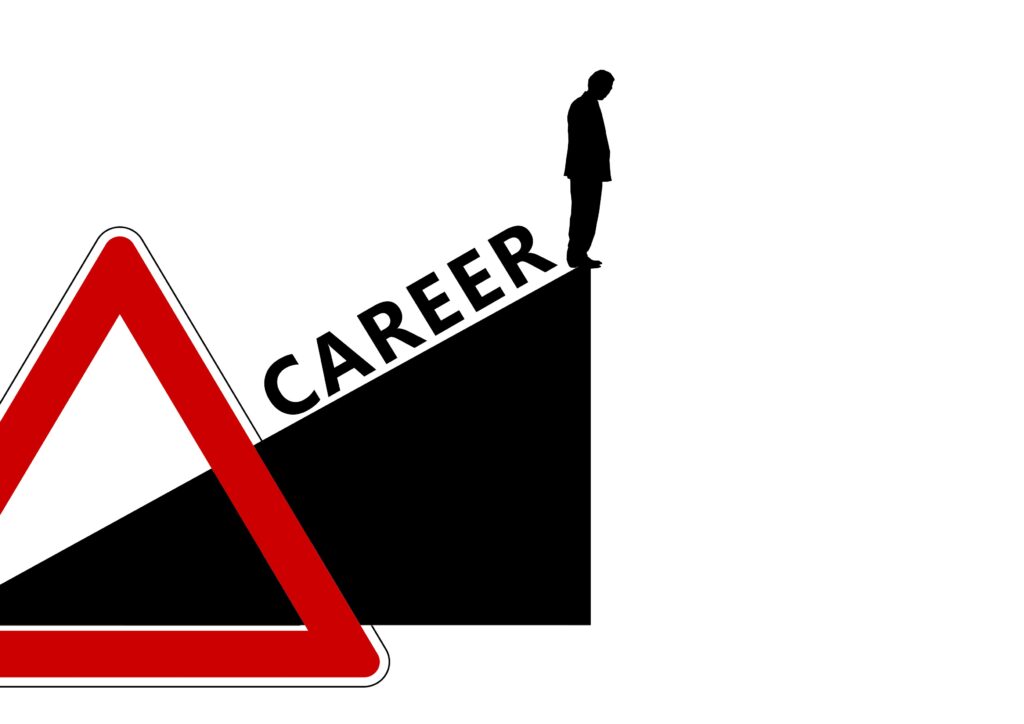Personal Finance Made Simple: Take Control of Your Finances & Design Your Dream Life
Money.
Everyone gets excited when they hear about money. How to get money? How to be very rich?
But we have very little knowledge of how to manage money?
what if you could take control of your money and turn it into a powerful tool to achieve your dreams?
Let’s discover how money management or personal finance can turn your dreams into reality!
Table of Contents
Let’s ask, what is money management or Personal Finance or Financial Management (all are the same)?
Personal finance is the management and planning of your own money and financial activities.
What does your Personal Finance mainly have?
It includes your,
- Earnings
- Expenses
- Investments
- Savings
Importance of Personal Finance
Personal finance involves everything related to your earnings, expenditures, and savings. It includes an analysis of your income, your spending habits, and the gap between what you earn and what you save.
Its goal is to maintain the financial stability of you and your family, both now and in the future.
So, why is Personal Finance Important?
We studied in school and college, but most of us didn’t have any subject or course related to personal finance. We didn’t worry about it at that time. But when it comes to our personal life, it becomes very essential. It is so important that it will keep you ahead of others.
The goal of personal finance is to improve your financial situation, meet your daily needs, save money, and ensure your financial stability.
You don’t keep all your money in one place, do you? But you also don’t invest in any sector where you can get returns.
You likely want to invest your savings in a place where you can withdraw all your money when needed or where you can get a good return.
You wouldn’t lend money to someone who won’t return it, nor would you invest in something that would result in a loss. Personal finance deals with all of these scenarios. That’s why having knowledge about personal finance is crucial.
The first step in personal finance is to assess your economic situation. Then, you can determine how to manage your finances, deciding on present and future spending, saving for the future, investing, lending, and borrowing. But it’s crucial to be fully aware of your economic condition before making these decisions.
By analyzing your current financial condition you can know if you’re financially stable or unstable.
Steps of Financial Situation Analysis
1. Check your balance
First of all, calculate the sum of all your assets like cash money, investment, savings, cars money, house money, and money in your wallet.
Then subtract the liability amount from the sum of your assets.
What is a liability?
Liability is simply something you owe money on. It’s like an IOU, but it can be for big things like houses or cars, or smaller things like unpaid bills. Liabilities are the opposite of assets, which are things you own.
After deducting liabilities from your assets, check if your balance is negative or positive. A positive balance indicates that your assets exceed your liabilities, while a negative balance means your liabilities outweigh your assets.
If it comes negative, then don’t worry. Because it’s your first analysis. Someone can learn something positive from it. For example, If you gradually pay off the mortgage on your house, it means you are slowly gaining ownership of your home.
So you don’t have to be tensed if your balance comes negative
2.Find the ratio of your debt against wealth
It means to divide your liabilities or total credits with your total assets. By this, you will be able to know how much liabilities you have against your wealth.
For example, John owes 200 dollars.
Total assets 1000 $
Divide John’s debt (which is $200) by his total assets (which is $1,000). So, $200 / $1,000 = 0.20
Convert it to a percentage by multiplying by 100%. In this case, 0.20 x 100% = 20%.
John’s debt-to-wealth ratio is 20%. This means that his debts make up 20% of his total assets
A lower debt-to-wealth ratio generally indicates a stronger financial position.
3.Set your goal
Setting your goal is very important. Even random persons or in your interview, they may ask you, what is your goal in 5 years?
Therefore, you should establish a financial goal for your life. Where do you envision yourself financially in 5 or 10 years?
This quote means if you never try, you will always fail. It’s like taking a shot in a sport – if you don’t even attempt it, you have no chance of scoring. It’s about taking chances and going for your goals.
So, if you don’t set any goal then how will you reach your goal?
After setting a goal, you have to compare your earnings and your expenses. It will help you to achieve your goal.
4.Set Budget
Budgeting is like planning your spending. Knowing the amount spent and the account from which it was spent is crucial details. Because if someone doesn’t know his spending, he can’t control his finances. There are many people I have seen that they always keep their details of money in where they spend it.
For example, Mike purchases 2 t-shirts and inputs the expense into his phone. He also records the amount spent on Uber rides. At the end of the month, this provides him with a detailed breakdown of his monthly spending. By tracking expenses, one can identify where their money was spent, such as restaurants, shopping malls, bills, consultations, taxis, and more.
Then you can understand which was your need and which was your want. Or if you spent much money than your expectation. So if you want to do saving you can reduce your reduce bill, or reduce transportation expenses.
So by tracking your expenses you can easily control your Personal Finance. If don’t track it then you cannot control it.
Outcome Of Personal Finance
There is a very big Risk between a person who knows Personal Finance and who doesn’t Know. Because if a person doesn’t know about his personal fiance he can’t track his financial risk.
And person who knows personal finance he may assume a probability of getting into a financial risk.
Many of us have heard about emergency funds.
When is an emergency fund required?
- Emergency funds are needed for:
- Medical emergencies
- Job loss
- Car repairs
- Home repairs
- Unexpected travel expenses
- Family emergencies
Amount of emergency funds
Some may ask a question, how much money should a person save for emergency funds?
Emergency funds of peoples vary. one’s amount is different from others.
For example, let’s say your monthly expense is 5000$. That means you will need 30000$ for 6 months. That means your emergency funds value should be at least 30000$.
Those who are of these facts they know about emergency funds. And they keep emergency funds. They can save themselves from sudden risks.
And that who don’t know doesn’t have any idea about that. Many don’t know that they may have a chance of falling into financial risk.
However, it brings a big difference between 2 persons who knows financial risk and who doesn’t. Especially to his economic life.
So, it is a must to know about these things in our Personal Finance is very important.
Common Mistakes of Personal Finance
Mistake 1:
We consider all of our debts as a single debt. In some instances, we take out long-term debt to meet short-term needs. Conversely, we may also use short-term debt for long-term purposes. We take debt much higher than our assets. But some are opposite, they think a lot before taking an even a short term loan.
So we do a lot of mistakes in terms of credit or taking debt.
Mistake 2:
Credit card users are required to pay their credit card bills on time. If they miss the payment deadline, the bank will impose additional charges. If you forget the bill payment date and consistently miss payments, these charges accumulate every month. By the end of the year, you may find that the total charges exceed the amount you spent on your card.
We often overlook these hidden expenses. However, if you take them into account, you may realize that you’ve spent two weeks’ worth of expenses or more on bank charges.
Mistake 3:
Few people prioritize saving money. We often don’t focus on savings. We spend what we earn.
For example, if your monthly earning is 7000$ then the expenses 6500$ or more. You are not left with enough money to save. If this happens then you won’t have savings. If you fall into any disaster you will need. You savings will prove you with necessary money. But if you don’t have sufficient money then what may happen?
If your expense is 6500 monthly then you will need 39000$ in emergency fund at least. If not possible then 20000$ is a must to keep.
Many people lack dedication towards savings, resulting in a lack of savings by middle age. Even if they have some savings, they often lack an early or monthly savings plan. Since earnings and expenses are typically measured on a monthly basis, it’s essential to have a monthly savings plan. Saving on a yearly or semiannual basis increases the risk of facing financial difficulties. Therefore, we must avoid these mistakes
Mistake 4:
The most common mistake that many of the people make is they don’t plan a budget. Some don’t know how much they want to spend. Some don’t even know their monthly expense. Then how will you save? Investment is something further away.

So everyone needs to make a budget at the start of the month.
Utilize a monthly budget planner to monitor your earnings and expenditures. By tracking your financial details each month, you can identify areas where expenses can be reduced, allowing you to save more money.
Understanding The Time Value of Money
The time value of money means a dollar today is worth more than a dollar tomorrow. Think of it like earning interest.
Imagine you have a choice: get $100 right now or get $100 a year from now. Which would you pick? Most people would take the $100 now. That’s the time value of money! Money today lets you invest and earn more money over time. So a dollar today is more valuable than a dollar waiting in the future.
If you invest this 100$ at a 10% rate you will have 110$ after a year.
So if you take money now then it will be valued more. But after a year its value will be lessened because of inflation and the growth potential.
Imagine you want to buy land valued at $30,000. You currently have $30,000, but you’re not planning to make the purchase. You think it’s safer to hold onto the money. However, when you decide to buy the land in 5 years, its price will likely rise due to inflation and growth potential.
This means the $30,000 you have now won’t hold the same value after 5 years. Its purchasing power will decrease. The value of money diminishes over time.
However, The value of $100 will decrease after 1 year, and it will decrease even further after 2 years.
Considering this, you wouldn’t keep your money under your pillow. Doing so would naturally decrease your demand for money. Therefore, it’s crucial to understand the time value of money.
So, whether you’re paying off debt or bills, borrowing money, taking out loans, buying assets, saving money, making any kind of investment, or engaging in any transaction, it’s important to keep in mind the time value of money.
Conclusion
Maintaining personal finance is not just about having money; it’s about managing it wisely to secure your financial present and future. Personal finance encompasses various aspects such as earnings, expenses, investments, and savings, all of which require careful planning and management.
In conclusion, maintaining personal finance is not only about accumulating wealth but also about managing it effectively to achieve financial security and prosperity. By adopting prudent financial habits, setting achievable goals, and understanding the dynamics of money, you can pave the way towards a brighter financial future. Taking charge of your personal finance may seem daunting at first, but it’s an investment in yourself and your future. The more you learn and the sooner you start, the better off you’ll be. So why not take control of your money today?



